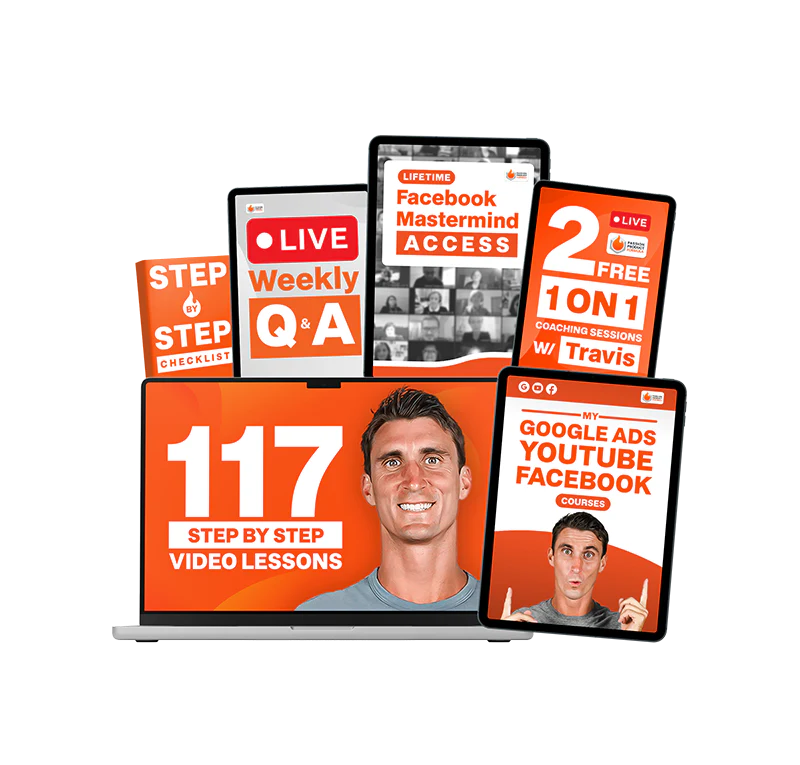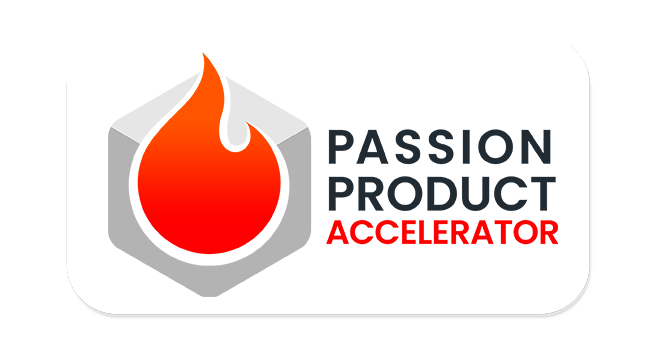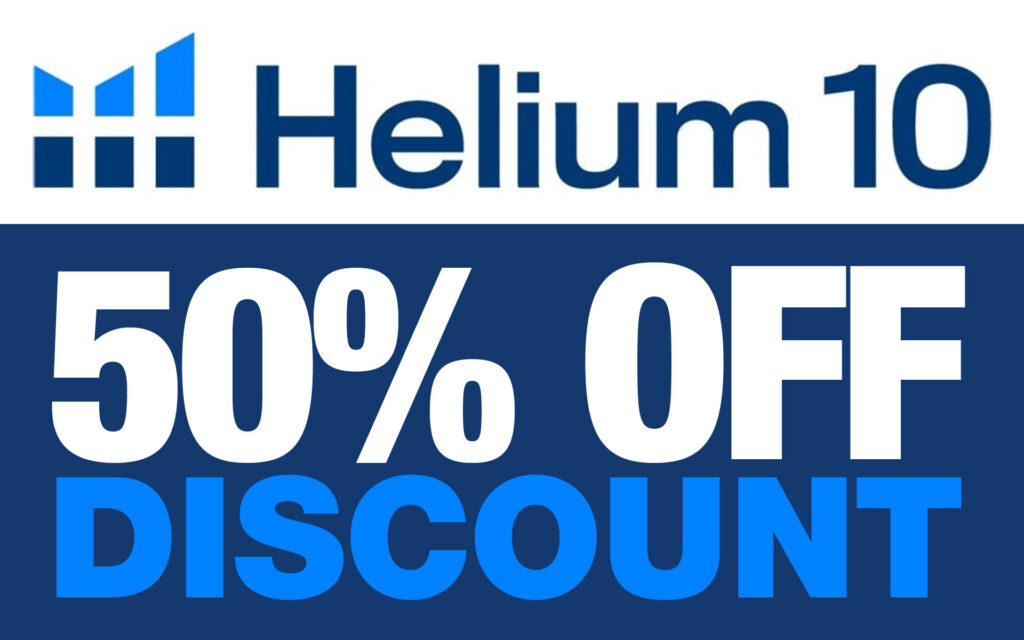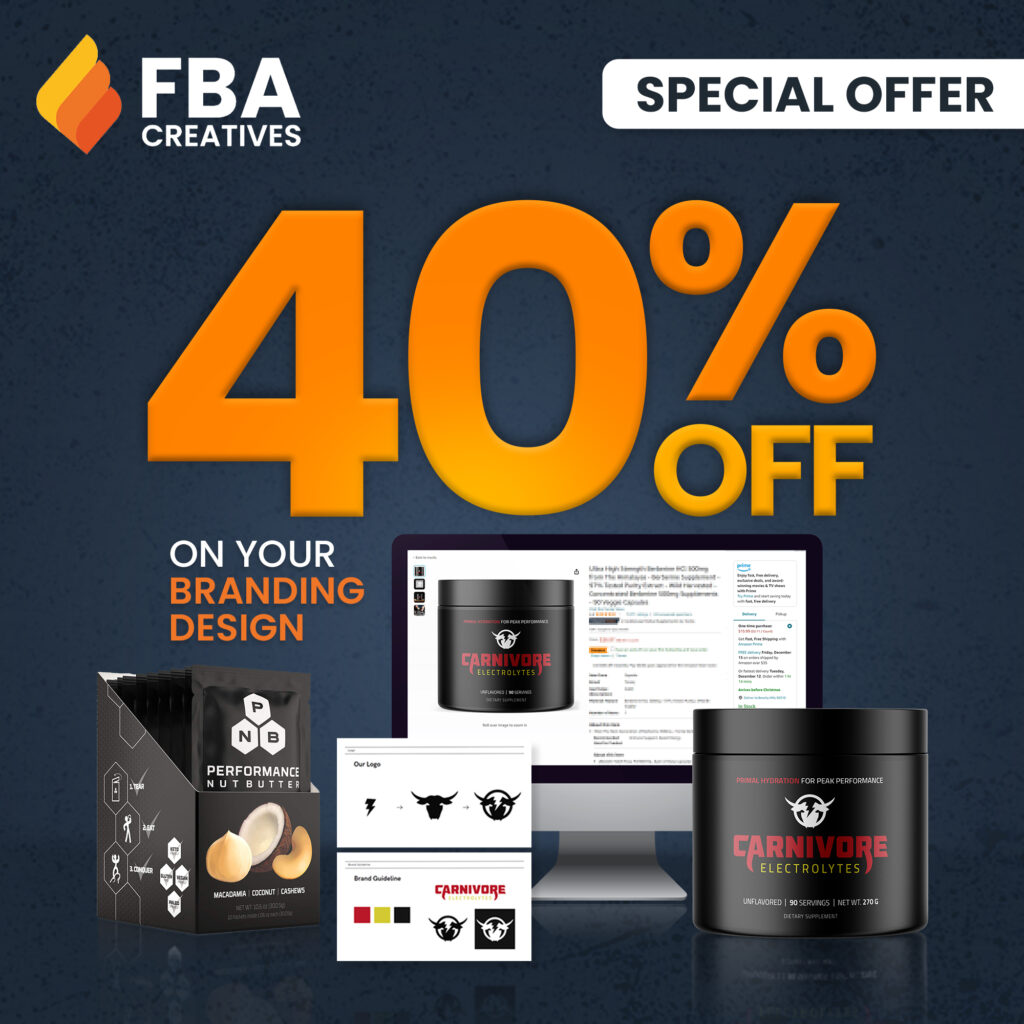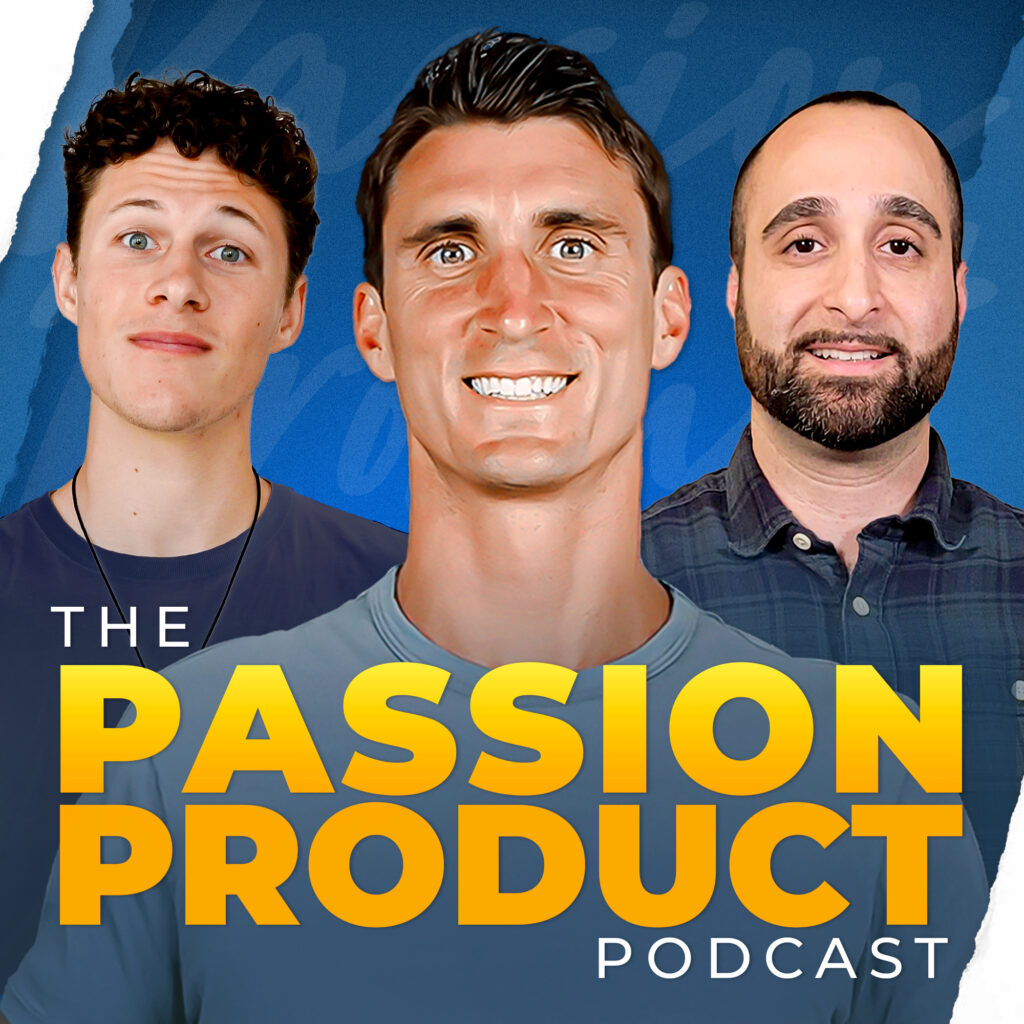Real entrepreneurs are achieving substantial profits through Amazon FBA, with documented cases demonstrating $26,458 in sales and $12,435 in profit within just two months. This success represents one example from a community where students consistently generate $100,000 to $2 million annually using systematic approaches rather than relying on luck. The Amazon marketplace offers unprecedented opportunities with 300 million Prime customers shopping daily and over $500 billion spent annually, where two-thirds of all sales come from third-party sellers, proving individual entrepreneurs can compete successfully alongside major corporations.
Success requires understanding the fundamental differences between selling approaches and choosing strategies for long-term growth, as 85% of new sellers pursue oversaturated methods like wholesale and private label, creating opportunities for innovative approaches. This guide focuses on the “passion product” method that has created multiple millionaires while building sustainable businesses. The comprehensive blueprint reveals the exact step-by-step process used to launch Carnivore Jerky from concept to profitability in under a week, teaching readers how to avoid costly mistakes that destroy most Amazon businesses and explaining why joining proven communities like the Passion Product Formula accelerates success through ongoing support and resources.
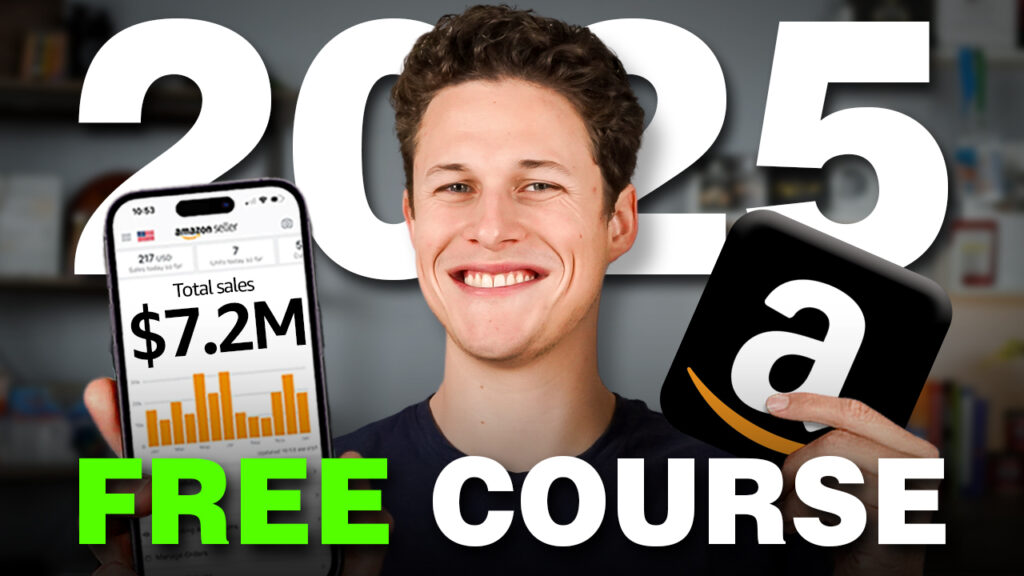
- Understanding Amazon FBA: Your Path to Passive Income
- The Four Ways to Sell on Amazon FBA: Finding Your Best Path
- Product Research Mastery: amazon FBA Million-Dollar Opportunity
- Manufacturing and Sourcing: Building Your Amazon FBA Supply Chain
- Product Design and Branding: Creating Amazon Marketplace Winners
- Legal Foundation and Business Setup: Protecting Your FBA Investment
- Amazon Seller Central Setup: Your Gateway to E-commerce Success
- Listing Optimization: Converting Browsers to FBA Buyers
- FBA Shipping Mastery: Getting Products to Customers
- Launch Strategy and Amazon PPC: Dominating from Day One
- Amazon PPC Advertising: Your FBA Traffic Generation Engine
- Real Amazon FBA Results: The $12,435 Profit Breakdown
- Your Next Steps: Joining the FBA Success Community
- Transform Your Financial Future Through Proven Amazon FBA Success
- Frequently Asked Questions
Understanding Amazon FBA: Your Path to Passive Income

The FBA Business System Explained
Amazon’s Fulfilled by Amazon (FBA) program transforms your business into a passive income machine. It handles all customer service, shipping, and returns on your behalf. You send your products to Amazon’s warehouses. They pick, pack, and ship every order while providing customer support 24/7. FBA makes your products Prime-eligible, which dramatically increases sales since Prime customers strongly prefer products with free two-day shipping.
Leveraging Amazon’s Infrastructure
This system leverages Amazon’s massive infrastructure investment of over $100 billion in customer acquisition and logistics networks. You benefit from their trusted brand reputation, advanced fulfillment technology, and global shipping capabilities without building these systems yourself. Prime products rank higher in search results. This creates a competitive advantage that drives organic traffic to your listings.
FBA Business Time and Cost Benefits
The FBA model differs significantly from traditional e-commerce approaches. Amazon handles the most time-consuming aspects of order fulfillment. Instead of spending hours packaging products and visiting post offices, you focus on product development, marketing, and scaling your business. Amazon’s bulk shipping rates often cost less than individual shipping. This improves your profit margins while providing faster delivery times.
Proven FBA Success Stories
Success stories within the Passion Product Formula community demonstrate the model’s effectiveness. Jeremy earns $30,000 monthly, AJ reaches $40,000 monthly, and Calvin generates over $500,000 in less than two years. These entrepreneurs built sustainable businesses that generate income even when they’re not actively working. FBA represents the optimal path for creating genuine passive income through product sales.
The Four Ways to Sell on Amazon FBA: Finding Your Best Path

Method 1: Amazon Retail Arbitrage
Amazon sellers typically choose from four distinct approaches. Each offers different risk levels, profit potential, and time requirements. Most beginners gravitate toward retail arbitrage. This involves finding discounted products in physical stores and reselling them on Amazon for higher prices. For example, purchasing a product for $99 at Lowe’s and selling it for $200 on Amazon generates substantial margins with minimal upfront investment.
Method 2: Amazon Wholesale Approach
Wholesale represents the second approach. Sellers purchase brand-name products directly from manufacturers at wholesale prices and resell them at retail prices on Amazon. This method provides access to established products with proven demand. For example, buying items for $26 per unit wholesale and selling them for $60 on Amazon. However, wholesale sellers function as middlemen without brand ownership or pricing control. This makes them vulnerable to manufacturer policy changes.
Method 3: Amazon Private Label Strategy
Private label involves taking existing products from platforms like Alibaba, adding your brand, and creating your own Amazon listing. This approach offers more control since you own the listing and don’t compete directly with other sellers on the same product page. Nevertheless, private label products remain easily replicable since the core product design belongs to the manufacturer. This limits long-term competitive advantages.
Method 4: Passion Products (Recommended)
Passion products represent the fourth and most powerful approach. This involves creating genuinely improved or entirely new products that solve specific customer problems. For instance, Brent’s Seir Pro blowtorch generates over $1 million annually by improving upon existing designs. Jeremy’s Slim Caddy organizer creates $100,000+ yearly revenue through innovative organization solutions. Passion products provide the strongest competitive moats, highest profit margins, and greatest potential for building valuable, sustainable businesses.
Product Research Mastery: amazon FBA Million-Dollar Opportunity

Starting with Personal Passion
Effective product research begins with identifying your personal passions and expertise areas. Genuine enthusiasm for your product category provides significant competitive advantages. You can leverage this knowledge to identify improvement opportunities that others might miss. You’ll build authentic marketing messages that resonate with customers. Passion-driven products typically sustain your motivation through inevitable challenges while creating natural content and marketing opportunities.
Using Amazon’s Free Tools
Amazon’s own data reveals profitable opportunities through their bestseller lists, new releases section, and movers and shakers rankings. These free tools show which products generate strong sales despite having few reviews or recent launch dates. For example, products selling 1,200 units monthly at $15 each generate over $200,000 annually. This proves substantial opportunities exist for new sellers who identify market gaps.
Professional Research Tools
Professional research requires tools like Helium 10‘s Cerebro and Magnet features. These analyze competitor keywords and identify search terms with high demand but low competition. These tools reveal customer search patterns. They help you understand exactly what phrases people type when looking for products like yours. Proper keyword research uncovers product ideas by showing search terms with strong volume but weak existing solutions.
Case Study: Carnivore Jerky Discovery
The Carnivore Jerky opportunity emerged through systematic research. We found growing interest in carnivore diet products combined with poor existing options for carnivore-specific jerky. Google Trends confirmed the carnivore diet’s increasing popularity. Amazon keyword research revealed thousands of monthly searches for “carnivore jerky” with limited quality results. This systematic approach consistently identifies profitable opportunities across multiple product categories.
Manufacturing and Sourcing: Building Your Amazon FBA Supply Chain

Evaluating Manufacturing Options
Successful manufacturing partnerships require careful evaluation of domestic versus international options. Each approach offers distinct advantages depending on your product type and business goals. Overseas manufacturing through platforms like Alibaba provides lower costs and established infrastructure. This makes it suitable for non-consumable products with larger order quantities. Recent tariff changes and quality control challenges have shifted many sellers toward domestic manufacturing for better oversight and faster turnaround times.
Finding the Right Partners
Google searches for industry-specific manufacturers often yield better results than general directories. Use targeted terms like “grass-fed beef jerky supplier” or “private label manufacturer.” Building relationships with local manufacturers provides communication advantages, faster problem resolution, and easier quality control compared to overseas partnerships. Domestic manufacturing supports faster inventory replenishment, which proves crucial during successful product launches.
Using Professional Directories
ThomasNet.com serves as America’s premier manufacturing directory. It connects sellers with verified domestic manufacturers across thousands of product categories. Working with verified suppliers reduces fraud risk while ensuring legitimate business relationships. Many domestic manufacturers offer smaller minimum order quantities. This allows new sellers to test products without massive upfront investments.
Real-World Application
The Carnivore Jerky manufacturing journey illustrates these principles. We chose domestic manufacturing for food safety compliance and faster turnaround times. Our manufacturer collaborated on recipe development, allowing orders as small as 600 units for initial testing. They provided rapid reorders when we unexpectedly sold out during launch week. This partnership enabled quick market entry while maintaining product quality and customer satisfaction standards.
Product Design and Branding: Creating Amazon Marketplace Winners
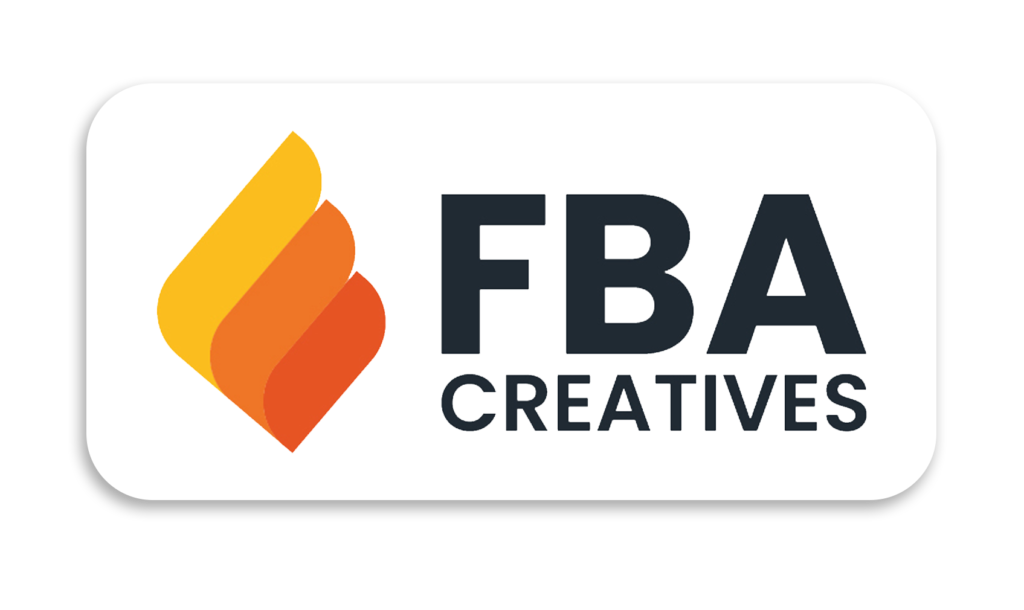
The Three Design Elements
Professional product design encompasses three critical elements: logo development, packaging design, and actual product improvement. Each component contributes to customer perception and sales performance. Investing in professional logo design through services like FBA Creatives, Fiverr, or 99designs creates the brand foundation that influences all other marketing materials. Your logo appears on every customer touchpoint, making it essential for building brand recognition and trust.
Packaging That Converts
Packaging design directly impacts sales performance. Customers cannot physically examine products before purchasing on Amazon, making visual presentation crucial for conversion rates. Packaging must stand out against Amazon’s white background while clearly communicating product benefits and target audience. For example, Carnivore Jerky’s black packaging with bold white and yellow text creates strong visual contrast while immediately identifying the target market through clear “CARNIVORE” messaging.
Product Innovation Process
Product design itself involves improving existing solutions or creating entirely new products that better serve customer needs. Collaborating with manufacturers often yields better results than working in isolation. Experienced manufacturers provide valuable insights about materials, production processes, and cost optimization. Starting with single SKUs simplifies inventory management, reduces complexity, and allows focused optimization before expanding to multiple variants.
Carnivore Jerky Design Success
The Carnivore Jerky design process exemplifies these principles through its premium matte standup pouch with resealable zipper. This combines functionality with visual appeal. The three-ingredient simplicity (bone broth, sea salt, and jerky) differentiates the product from competitors while appealing to health-conscious carnivore dieters. Thoughtful design decisions create competitive advantages that extend far beyond initial sales.
Legal Foundation and Business Setup: Protecting Your FBA Investment

Choosing Business Structure
Establishing proper business entities protects personal assets while optimizing tax efficiency and professional credibility. Limited Liability Companies (LLCs) provide liability protection by separating business and personal assets. Costs vary significantly by state with California charging $800 annually regardless of profitability. DBAs (Doing Business As) offer affordable business name registration without liability protection. This makes them suitable for low-risk products and cash-conscious entrepreneurs.
Essential Documentation
Essential documentation includes obtaining an EIN (Employer Identification Number) free through the IRS website. You’ll need state-required seller’s permits without paying unnecessary fees to third-party services. Establish dedicated business bank accounts. Maintaining strict separation between business and personal expenses preserves liability protection while simplifying tax preparation and maximizing deductible business expenses. Business credit cards provide valuable rewards while building business credit history.
Intellectual Property Protection
Intellectual property protection becomes crucial as your business grows. Trademark applications cost approximately $275 through USPTO.gov for brand name or logo protection. Provisional patents cost around $75 and provide one-year protection for truly innovative products. Most Amazon products don’t qualify for patent protection. Nevertheless, trademarks prove valuable for brand protection and Amazon Brand Registry enrollment.
Real Case Example
The Peak Primal LLC case study demonstrates these principles. We paid $250 in Legal Zoom fees plus California’s $800 state fee creating legal protection for a food product business. This structure enabled professional banking relationships, streamlined tax management, and liability protection crucial for consumable products. Proper legal foundation creates long-term value that far exceeds initial setup costs.
Amazon Seller Central Setup: Your Gateway to E-commerce Success
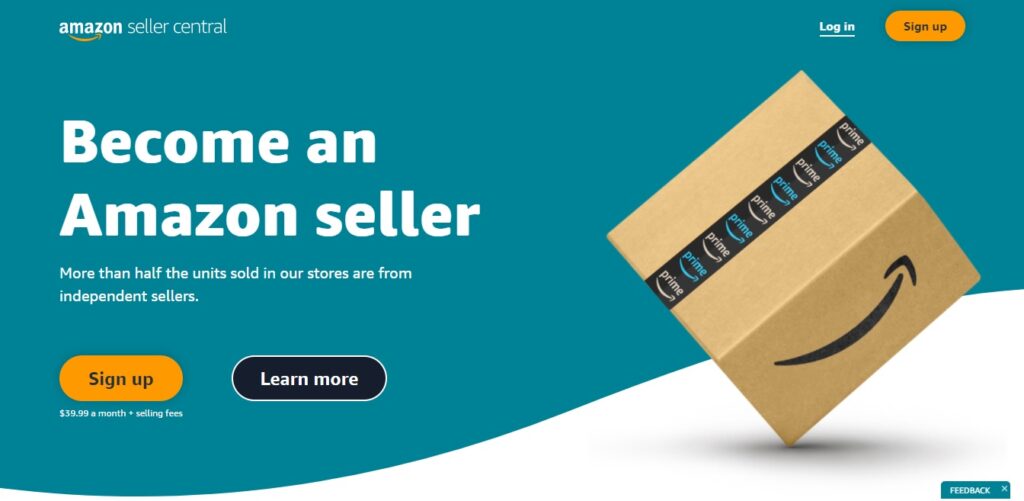
Avoiding Common Mistakes
Amazon seller account creation requires careful attention to detail. Five common mistakes can result in permanent bans or lengthy approval delays. Avoid creating multiple accounts without explicit Amazon permission, as the platform strictly monitors for duplicate registrations. Use professional business email addresses rather than generic providers like Gmail or Yahoo. Ensure all credit cards are legitimate business or personal cards rather than prepaid options.
Plan Selection Strategy
The Professional selling plan costs $39.99 monthly but provides essential features. These include inventory management tools, promotional capabilities, and detailed reporting that Individual plans lack. Professional accounts become cost-effective when selling 40 or more units monthly since Individual accounts charge 99 cents per sale. Professional plans enable advanced features like spreadsheet inventory uploads and custom shipping rates for merchant-fulfilled orders.
Documentation Requirements
Account approval requires submitting proper documentation. This includes passport or driver’s license verification, bank account statements for address confirmation, and business registration documents. Amazon may request additional verification during the approval process. Patience is essential rather than attempting to expedite through multiple applications. Avoid changing any account information immediately after approval, as this triggers security reviews that can suspend selling privileges.
Implementation Example
The Carnivore Jerky account setup illustrates proper procedure. We used Peak Primal as the business name with professional email addresses and verified business documentation. This methodical approach ensured smooth approval without delays or complications. Investing time in proper account setup prevents future problems while establishing professional credibility with Amazon’s seller support team.
Listing Optimization: Converting Browsers to FBA Buyers
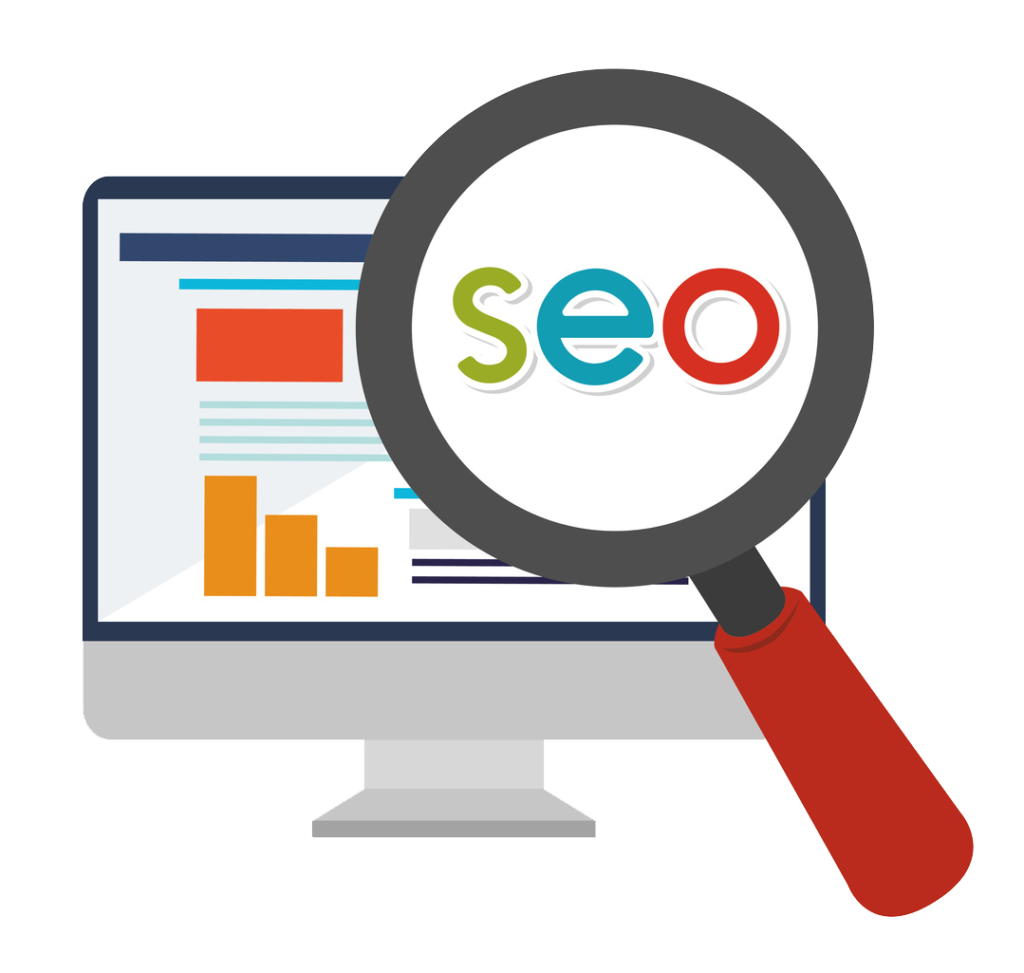
Understanding Amazon FBA SEO
Amazon functions as a search engine where customers type specific queries to find products. Keyword optimization is crucial for visibility and sales performance. Your product title, bullet points, and backend keywords must contain terms that customers actually search for. Amazon’s algorithm matches search queries with listing content to determine relevance. Products ranking higher in search results receive exponentially more sales, with top positions capturing the majority of customer clicks and purchases.
Title Optimization Strategy
Title optimization requires front-loading primary keywords while incorporating benefits and key features within Amazon’s character limits. The Carnivore Jerky title demonstrates this approach: “Carnivore Jerky – Grass-Fed Beef Jerky – Three Simple Ingredients – All Natural Carnivore Diet Snack, Sugar-Free, Keto Friendly Protein Made with Bone Broth and Sea Salt.” This immediately identifies the target audience while incorporating multiple search terms. This approach maximizes search visibility across various customer queries.
Visual Impact Elements
Visual elements significantly impact conversion rates. Heat map research shows customers focus primarily on main images before considering reviews and pricing. Main images must comply with Amazon’s white background requirements while standing out from competitors and clearly communicating product benefits. Secondary images should address common customer questions, highlight key features, and provide social proof through charts and comparisons.
Bullet Point Psychology
Bullet points serve dual purposes by incorporating additional keywords for search visibility while persuading customers to purchase through benefit-focused messaging. Effective bullet points lead with customer benefits rather than technical features. They address potential objections and use language that resonates with your target audience. Proper keyword research through tools like Helium 10 identifies the exact phrases customers use when searching for products like yours.
FBA Shipping Mastery: Getting Products to Customers
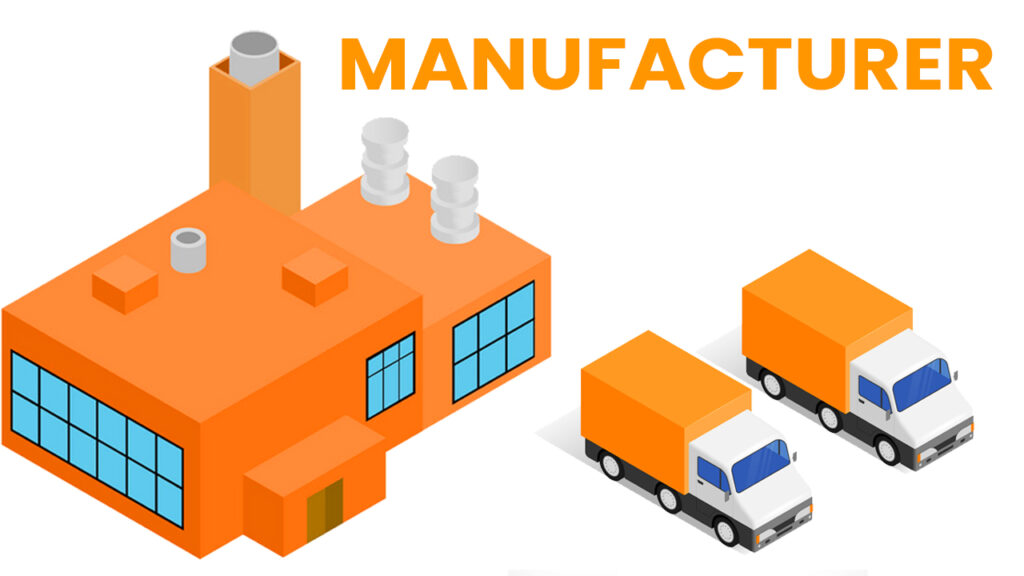
Understanding Requirements in Amazon FBA
Successful FBA shipping requires understanding Amazon’s specific requirements while optimizing costs through proper packaging and carrier selection. Five common mistakes can cost thousands of dollars: incorrect ship-from addresses, wrong shipping method selection, inadequate labeling, violating size/weight restrictions, and failing to track shipments properly. Amazon imposes strict guidelines including 50-pound weight limits and 25x25x25 inch dimensional restrictions that sellers must follow exactly.
Shipping Method Selection
Shipping method selection depends on order size. Small parcel delivery is suitable for smaller quantities while less-than-truckload (LTL) works better for pallet shipments. Amazon’s partnership with UPS provides significant shipping discounts compared to standard rates. This makes their partnered carriers the most cost-effective option in most situations. Optimizing unit density within boxes reduces overall shipping costs while maintaining compliance with Amazon’s requirements.
Labeling Best Practices
Product labeling involves either self-labeling with printed FN SKU labels or paying Amazon 50 cents per unit for their labeling service. Self-labeling provides substantial cost savings. Printing UPC codes directly on packaging eliminates labeling requirements entirely while reducing handling time and potential errors. Proper labeling ensures smooth warehouse receiving and faster inventory availability for customer orders.
Real Implementation
The Carnivore Jerky shipping experience demonstrates these principles. We used direct manufacturer-to-Amazon shipping for our initial 600-unit test run. However, we encountered box dimension issues requiring repackaging into compliant containers before shipping. Working with domestic manufacturers enabled rapid reorders when we unexpectedly sold out during launch week. This highlights the importance of responsive manufacturing partnerships.
Launch Strategy and Amazon PPC: Dominating from Day One

The Critical First Week
Successful Amazon launches require understanding that the first eight days determine long-term ranking performance. Amazon evaluates new products through sales velocity during this critical window. Sales velocity combines click-through rate, conversion rate, and external traffic to create momentum that influences organic search rankings for months afterward. Prioritizing sales volume over immediate profitability during launch week creates sustainable competitive advantages.
PPC Campaign Structure
Amazon PPC advertising enables immediate visibility by placing your products at the top of search results, even with zero reviews or established rankings. Automatic campaigns provide keyword discovery while manual campaigns target specific high-value search terms identified through research. Product targeting campaigns allow advertising on competitor listings, capturing customers who are actively comparing similar products.
External Traffic Sources
External traffic sources like email lists and social media amplify launch momentum while reducing dependence on Amazon advertising. The Carnivore Jerky launch leveraged our existing Carnivore Electrolytes customer base through launch-day emails offering special discounts. Building social media presence through platforms like TikTok and YouTube creates sustainable traffic sources that reduce advertising costs over time.
Launch Results for Amazon FBA
The Carnivore Jerky launch generated 48 units in a single day through coordinated PPC campaigns and email marketing. This created such strong momentum that we nearly sold out our entire initial inventory. This success required emergency manufacturer communication for rapid reorders. It demonstrates both the power of proper launch execution and the importance of inventory planning. Successful launches balance aggressive marketing with adequate inventory to sustain momentum throughout the critical first weeks.
Amazon PPC Advertising: Your FBA Traffic Generation Engine
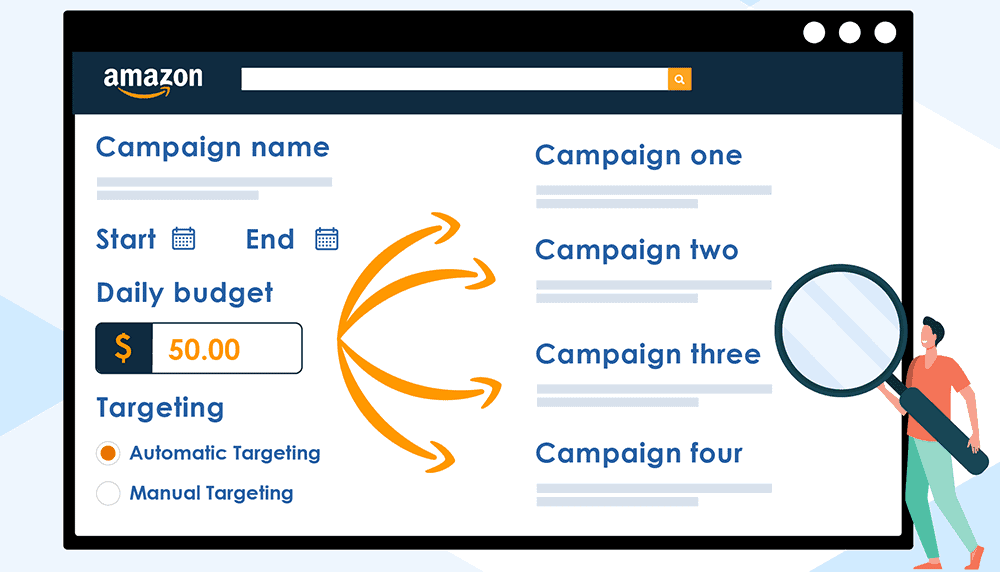
Campaign Types Overview
Amazon PPC operates through three campaign types that serve different strategic purposes. These include automatic campaigns for keyword discovery, manual campaigns for targeted optimization, and product campaigns for competitor infiltration. Automatic campaigns with close match targeting provide the safest starting point. They focus ad spend on highly relevant search terms while gathering performance data. Separating targeting groups into individual ad groups enables precise bid management and performance optimization.
Manual Campaign Strategy for Amazon FBA
Manual keyword campaigns require thorough research through tools like Helium 10 to identify high-value search terms with strong conversion potential. Targeting exact match keywords provides maximum control over ad placement while broad match captures additional traffic at higher risk levels. Implementing negative keywords prevents ads from showing for irrelevant searches. This protects budgets while improving overall campaign performance.
Product Targeting Tactics
Product targeting campaigns enable advertising directly on competitor listings. This captures customers who are actively evaluating similar products. This strategy works particularly well when targeting products with poor reviews, limited images, or weak value propositions compared to your offering. Category targeting can work for broad product categories, though individual product targeting typically provides better control and performance.
Optimization Process
Advanced PPC management involves continuous optimization based on performance data. Successful campaigns require regular keyword additions, bid adjustments, and negative keyword updates. Tools like Helium 10‘s keyword research features help identify new opportunities while performance reports reveal optimization possibilities. Treating PPC as an ongoing optimization process rather than a set-and-forget system maximizes long-term profitability and market share.
Real Amazon FBA Results: The $12,435 Profit Breakdown

Revenue Achievement in Amazon FBA
The Carnivore Jerky case study generated $26,458 in total sales over two months. This demonstrates the rapid profit potential of properly executed Amazon FBA businesses. This revenue resulted from systematic execution of proven strategies rather than luck or unique circumstances. These results are replicable for other entrepreneurs following similar approaches. These numbers represent actual profits after all expenses, providing realistic expectations for new sellers.
Detailed Cost Analysis
Cost analysis reveals the true profitability structure. We had $4,352 in manufacturing costs, $2,279 in Amazon selling fees, $642 in FBA fulfillment fees, and $675 in shipping costs. This totaled $13,523 in expenses. This left $12,435 in net profit representing a 47% profit margin that exceeds most traditional business models. These margins improve over time as sales volume increases and fixed costs are spread across more units.
Critical FBA Success Mistakes
Three critical mistakes prevent most entrepreneurs from achieving similar results. The first is insufficient effort in marketing and promotion. Successful sellers actively build social media presence, engage with their target audience, and create content that drives traffic beyond Amazon’s platform. For example, AJ’s TikTok strategy contributed significantly to his $500,000 first-year results through consistent content creation and audience engagement.
Timing and System Importance
The second mistake involves delayed action due to analysis paralysis. Entrepreneurs like Brent lost an estimated $360,000 in profits by waiting an extra year before launching his Seir Pro blowtorch. The third mistake involves following random advice rather than proven systems. This highlights the value of programs like the Passion Product Formula that provide structured guidance and community support throughout the entire process.
Your Next Steps: Joining the FBA Success Community

Comprehensive Program Benefits
The Passion Product Formula provides comprehensive guidance through every phase of Amazon FBA business development. This ranges from initial product research through scaling successful operations. This program includes step-by-step modules covering all topics discussed in this guide plus advanced strategies for optimization, scaling, and long-term business development. Weekly coaching calls provide direct access to experienced instructors who can answer specific questions and provide personalized guidance.
Community Network Value
Community support represents one of the program’s most valuable benefits. It connects you with other entrepreneurs at various stages of their Amazon journey. This network provides manufacturer recommendations, launch support through coordinated purchasing, and ongoing motivation through shared experiences and success stories. The private Facebook group enables daily interaction with peers facing similar challenges and opportunities.
Proven Track Record
Success stories from program members demonstrate the system’s effectiveness across diverse product categories and backgrounds. Entrepreneurs achieve consistent six-figure and seven-figure annual revenues. Jeremy’s Slim Caddy generates over $30,000 monthly while Calvin’s product reached $500,000 in under two years. This proves the model works across different niches and experience levels. These results come from following the same systematic approach outlined in this guide.
FBA Investment Value
Investment in proven education and community support accelerates success while preventing costly mistakes that destroy most Amazon businesses before they become profitable. The program’s cost represents a fraction of potential monthly profits while providing lifetime access to resources, updates, and community connections. Entrepreneurs serious about building successful Amazon FBA businesses should prioritize joining established communities with proven track records over attempting to navigate the complex landscape alone.
Transform Your Financial Future Through Proven Amazon FBA Success
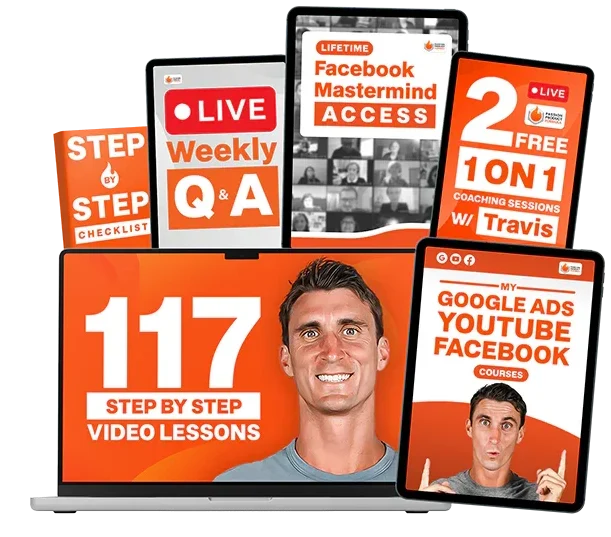
Amazon FBA represents one of today’s most accessible paths to financial independence. Documented case studies prove that ordinary entrepreneurs can generate extraordinary results through systematic execution. The $26,458 in sales and $12,435 in profit achieved with Carnivore Jerky demonstrates the real potential available to those who combine proper strategy with consistent action. This success story represents just one example from a community where students regularly achieve six-figure and seven-figure annual revenues.
The four selling approaches outlined in this guide provide options for entrepreneurs at different experience levels and risk tolerances. Passion products consistently deliver the strongest long-term results. The systematic process from product research through launch optimization eliminates guesswork while maximizing profit potential. Proper legal structure and business setup protect your investment while positioning your venture for sustainable growth.
Success requires more than information; it demands community support, proven systems, and ongoing guidance from experienced practitioners who have navigated these challenges successfully. The Passion Product Formula provides this comprehensive support system while connecting you with other entrepreneurs committed to building life-changing businesses. The program’s track record includes numerous members achieving financial freedom through Amazon FBA.
Your Amazon FBA journey begins with a single decision to take action rather than remaining in analysis paralysis that prevents most people from ever starting. Every month of delay represents lost opportunity as successful products generate compound returns through improved rankings, customer reviews, and brand recognition. Entrepreneurs serious about transforming their financial situation should begin their Amazon FBA education immediately while market opportunities remain accessible to new sellers.
Frequently Asked Questions
How much money do I need to start an Amazon FBA business?
Starting costs vary significantly based on your product choice and approach, though most successful Amazon FBA businesses require $3,000 to $10,000 for initial inventory, legal setup, and marketing. Specifically, the Carnivore Jerky launch required approximately $5,000 for initial manufacturing, legal setup, design work, and initial marketing efforts. However, some entrepreneurs start with smaller budgets by choosing lower-cost products or beginning with retail arbitrage before transitioning to private label or passion products.
How long does it take to see profits from Amazon FBA?
Most successful Amazon FBA businesses achieve profitability within 60 to 90 days when following proven systems and strategies. The Carnivore Jerky case study generated $12,435 in profit within two months, though initial weeks focused on building momentum rather than immediate profitability. Additionally, factors like product selection, marketing execution, and inventory management significantly influence timeline to profitability.
Do I need experience in business or e-commerce to succeed with Amazon FBA?
No prior business experience is required, though success depends on following proven systems and receiving proper guidance throughout the process. Many successful Amazon FBA entrepreneurs, including AJ who transitioned from bartending to $500,000 annual revenue, started without business backgrounds. However, joining programs like the Passion Product Formula provides essential education and support that accelerates learning while preventing costly mistakes.
What’s the difference between passion products and private label?
Passion products involve creating genuinely improved or entirely new products that solve specific customer problems, while private label typically means adding your brand to existing products without substantial modifications. Specifically, passion products provide stronger competitive advantages because they’re harder to replicate and create genuine customer value. Moreover, passion products typically command higher profit margins and build stronger customer loyalty compared to basic private label approaches.
Is Amazon FBA still profitable in 2024 with increased competition?
Amazon FBA remains highly profitable for entrepreneurs who choose differentiated products and execute proven strategies, despite increased seller competition in basic categories. The key lies in avoiding oversaturated approaches like wholesale and basic private label while focusing on innovation through passion products. Additionally, Amazon’s continued growth with 300 million Prime customers creates expanding opportunities for sellers who provide genuine value to specific customer segments.
How do I handle inventory management and avoid running out of stock?
Successful inventory management requires tracking sales velocity, monitoring competitor activity, and maintaining strong manufacturer relationships for rapid reorders. The Carnivore Jerky experience taught valuable lessons about inventory planning, as our successful launch nearly depleted initial inventory within days. Subsequently, working with domestic manufacturers enables faster reorders compared to overseas suppliers, though proper forecasting prevents stockouts regardless of manufacturer location.


